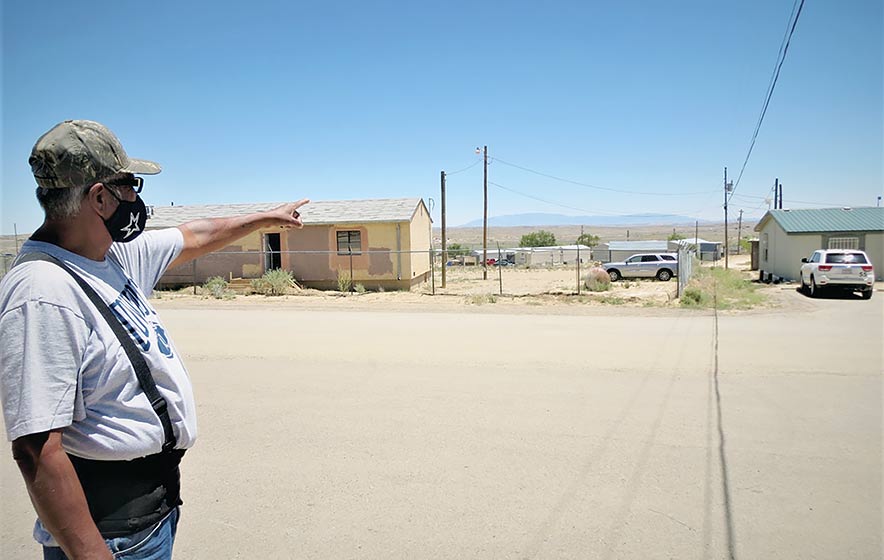
- Details
- By Levi Rickert
WINDOW ROCK, Ariz. — To’hajiilee, a Navajo Nation community with 2,500 residents, is in desperate need of safe drinking water. Located 24 miles west of Albuquerque, N.M., the community’s water supply problem has become exacerbated by the COVID-19 pandemic, as essential health and safety guidelines call for frequent hand washing and proper sanitization.
Last month, To’hajiilee Chapter President Mark Begay told the Navajo Times that the water in their community is “dirty” and “smells like rotten eggs.”
A To’hajiilee-Albuquerque water pipeline project was created to support the immediate and long-term water needs of the Navajo people of the To’hajiilee satellite community. The project calls for a pipeline to bring in fresh water from Albuquerque through a proposed 7.2-mile stretch.
Currently, the project is being blocked due to the non-responses of both Western Albuquerque Land Holdings (WALH) and the Garrett Development Corporation of Arizona (GDCA).
The Navajo Nation Council, local To’hajiilee Chapter government, Navajo community members and Navajo Nation Council Delegate Jamie Henio (Alamo, Ramah, Tohajiilee) are seeking immediate relief as critical local water wells are expected to go dry by year’s end.
“The Navajo people living in the To’hajiilee community desperately need a long-term, reliable water supply,” said Henio. “Without this important water pipeline project, To'hajiilee existing water wells will continue to fail after years of ‘band-aid’ fixes. Five have failed already, and the sixth has less than 11 months until it will also fail.”
U.S. Sen. Martin Heinrich has weighed in and is calling for a solution to help the project move beyond the roadblock by the private development companies.
“I find it unconscionable that Western Albuquerque Land Holdings and Garrett Development Corporation have been unwilling to come to the negotiating table to help the To’hajiilee Chapter secure access to clean water. This is truly a humanitarian crisis and we need a solution immediately,” Heinrich said on social media.
“The Navajo Nation Council has always fully supported the To’hajiilee-Albuquerque water pipeline project, and we have reached out to state and national leaders throughout this process to ensure their support, as well,” 24th Navajo Nation Council Speaker Seth Damon said. “This is the most viable option for a stable source of water for the To’hajiilee community, and we’re willing, as Navajo leaders, to work with any partner or private company to make sure it continues to move forward.”
“Unless these companies give us the opportunity to negotiate access through the property, when the last To’hajiilee community water well fails, Navajo families will have to resort to bringing in water with emergency tanker trucks,” Henio stated. “We call on the Navajo People and those beyond the Navajo Nation to help us bring these private companies to the table so that the people of the To’hajiilee community can have access to clean water. Time is of the essence.”
More Stories Like This
Native News Weekly (August 25, 2024): D.C. BriefsUS Presidents in Their Own Words Concerning American Indians
Haaland Meets with Southern New Mexico Law Enforcement on Public Safety Priorities
This Day in History – Dec. 26, 1862: 38 Dakota Men Executed by Order of Abraham Lincoln
Merry Christmas 2025
Help us defend tribal sovereignty.
At Native News Online, our mission is rooted in telling the stories that strengthen sovereignty and uplift Indigenous voices — not just at year’s end, but every single day.
Because of your generosity last year, we were able to keep our reporters on the ground in tribal communities, at national gatherings and in the halls of Congress — covering the issues that matter most to Indian Country: sovereignty, culture, education, health and economic opportunity.
That support sustained us through a tough year in 2025. Now, as we look to the year ahead, we need your help right now to ensure warrior journalism remains strong — reporting that defends tribal sovereignty, amplifies Native truth, and holds power accountable.
 The stakes couldn't be higher. Your support keeps Native voices heard, Native stories told and Native sovereignty defended.
The stakes couldn't be higher. Your support keeps Native voices heard, Native stories told and Native sovereignty defended.
Stand with Warrior Journalism today.
Levi Rickert (Potawatomi), Editor & Publisher

